- Home
- Joe R. Lansdale
Piercing the Darkness: A Charity Horror Anthology for the Children's Literacy Initiative Page 13
Piercing the Darkness: A Charity Horror Anthology for the Children's Literacy Initiative Read online
Page 13
After two days of photographing the changes in his flesh as it sat on the kitchen table, she’d made the decision to cook it, but what had earlier been such a compelling new series for her portfolio, now seemed a waste of time. Darkness had closed on her these past days, hampering her perception, and now she wondered if this final chapter of her portfolio would ever be completed. “Maybe it doesn’t matter.”
Devon’s head lolled to the side, his eyes glazed and distant. Drool clung to the corners of his mouth, and a wheezing sigh escaped him. “Lydia.”
“I didn’t mean to wake you,” she said, only then aware that she’d spoken aloud. Glancing down at the fly, she wondered if he was watching too.
“No more,” he whispered. “Take me down to the snow. Please, I…I don’t want to die here.”
Slowly, Lydia curled her fingers into a fist. Inside, the fly offered little resistance.
“We’ll see,” she said. “We’ll see.”
— | — | —
EXIT STRATEGY
TIM WAGGONER
The first thing you’re aware of is darkness.
You’re not sure if your eyes are open, so you reach up to check. You quickly draw your hand away, blinking furiously, eyes watering. So, two things established. Your eyes are definitely open, and you’re surrounded by absolute darkness. Unless, that is, you’re blind. Really, how would you know?
It’s a frightening thought.
You’re lying naked on a wet, spongy surface, and there’s a foul, acrid smell in the air that makes your stomach twist with sudden nausea. You sit up to get your nose farther away from the stink, your body moving easily enough. It doesn’t appear you’re injured, so that’s good news. It’s warm in here—wherever here is—almost too warm. You’re glad for your lack of clothes. It would be stifling in here otherwise. Although sitting up was no problem, standing is another matter. The spongy ground gives beneath you, almost as if you’re inside a children’s bouncy house, but you manage to get up and stay on your feet. You have to keep shifting your weight from one foot to another, though, as if standing on the deck of a ship at sea.
You stand there for some time, trying to decide what to do next. You have no memory of how you came to be in this place and no knowledge of what this place might be. You have no knowledge of your identity, not even your gender. You let your hands explore your body, and after a few seconds, you settle the gender issue. You don’t know your age, but you’re an adult, and probably not too old. Your skin is still smooth enough.
How big is this place? You can’t see walls or a ceiling. You could be in a structure the size of a broom closet or one that stretches outward in all directions toward infinity. You can’t tell. You consider shouting. Maybe the echoes, if any, will give you some idea of this place’s dimensions. But just because you’re currently alone doesn’t mean there isn’t someone else here with you. Maybe many someones—and there’s no guarantee they’d be friendly. So you remain silent, and—unable to come up with a better plan—you start walking, your bare feet making soft slapping sounds on the wet spongy ground. No matter how large this place may be or how small, there has to be a door or exit of some kind, or else how did you get here in the first place?
You have no idea how long you walk. How can you measure time in a place like this? You wish you’d thought to count your footsteps, but you didn’t and it’s too late to start now. Eventually, the tender flesh on the bottom of your feet starts to sting, and your throat becomes raw from breathing in the acrid air. At least the stink no longer nauseates you. That’s something. You do, however, feel a different sensation in your stomach. It’s not hunger, and it’s not exactly pain. More like an itching, crawling sensation. Whatever it is, you decide to ignore it. You have bigger problems to deal with right now.
You walk for some time longer, long enough for you to consider taking a break and resting, although you’re reluctant to sit. You don’t like the idea of plunking your bare ass in the strange fluid covering the ground. A few steps farther, and you smack face-first into some kind of barrier. You’re not walking fast enough for there to be much impact, so you don’t fall backward, although you have to do a little jig to keep your balance on the spongy ground. The barrier is covered with some thick, sticky substance which is now smeared all over the front of your body. In addition, you feel a sharp pain in your stomach. It causes you to take in a hissing breath of air, but you barely notice, so disgusted are you by the slime slathered over your face, chest, arms, and legs. You shake your body and run your fingers over your skin in an attempt to get off as much of the goo as you can. It splatters to the ground in large gloppy chunks, but you can only remove so much. It’s too thick, too sticky.
Doing your best to ignore the remaining slime coating your skin, you step forward and slowly extend your hands toward the barrier. Its surface is coated in a thick layer of goo, but when you press harder, you can feel the spongy material beneath. It feels a lot like the ground. You experience pressure in your abdomen again. You stop pressing on the barrier, and the internal pressure eases. You push again, and the pressure returns. Frowning, you make a fist and punch the barrier as hard as you can. You let out a cry of pain and double over, hands pressed to your abdomen. You stand like that, crouched over, teeth gritted, breathing hard, until the pain subsides. When it’s diminished to a dull ache, you stand upright once more.
It’s not possible, of course, but you know deep down in your gut—no pun intended—what’s going on. You are trapped inside your own stomach. How you got here isn’t important, and neither is the precise nature of “here.” Your feet hurt because you’ve been walking for God knows how long in gastric acid, and you don’t know how much longer you can go on before the flesh is eaten down to the bone. You need to get out—now.
A memory comes to you then, the first you’ve had since becoming aware in this place. It’s a memory of a diagram you saw once in an old book when you were a child. You can’t remember where you got the book from. Maybe it belonged to one of your parents, or maybe you stumbled across it in a library. Whichever the case, you remember the illustration—a man’s head and throat, cut in half long ways to reveal the inside. A progression of three pictures showed the tip of the man’s tongue arcing back toward the opening of his throat, going down and dragging the rest of the tongue along with it until it’s pulled tight, blocking his airway and killing him. Beneath the picture, a simple description: A man swallows his tongue.
The idea terrified you, and ever since—even into your adult years—you’ve slept on your side so that you won’t swallow your tongue in your sleep and suffocate yourself. Even when you became an adult and learned tongue swallowing was impossible, a kind of medical urban legend, you continued sleeping on your side. Why take chances? Now you wonder if you finally did it, rolled over onto your back one night, swallowed your tongue and—like a cartoon vacuum cleaner sucking in its own cord—swallowed yourself out of existence.
Screw it. The why doesn’t matter. All that matters is getting out.
You spring forward and begin hitting and kicking at the barrier—at the inner lining of your stomach—clawing at it with your fingers, tearing at it with your teeth. The pain inside your gut is excruciating, but you don’t stop. If anything, you redouble your efforts. You tell yourself it’s like birth. Yes, there’s a hell of a lot of pain, but in the end, it will be worth it.
Tissue tears and blood gushes like a broken water main, splashing your eyes, filling your nose and mouth, but still you don’t stop. You keep digging until you make a large enough opening, and then you begin wriggling, clawing and chewing all the way, making a soft slick tunnel as you go, screaming in agony as the smaller you inside also tries to dig free. As does the you inside that you, and the you inside that you, and the you inside that you . . .
Even though you’re in so much pain you can barely think, you realize that you had the wrong metaphor when you thought of cartoon vacuum cleaners. A nesting doll is more like it.
&nbs
p; You keep digging, and you keep screaming.
Every last one of you.
— | — | —
ABATTOIR BLUES
JAMES A. MOORE
Where to begin, that’s the catch here. I mean, I could start at the beginning, of course, but where is that? Do I start with my birth? No, because, really, I’m not important to the story, I’m just the witness. Do I start with the state of the world? Do I tell you about the women who seemed so much a part of it, Katie or the other girl, Brittany? Or do I start with the scariest bastard I’ve ever met, Bryce Darby?
It’s not an easy thing to do, but I suppose I’ll just start and see where this goes.
First, it was back in the bad days. The really bad ones, the ones other old bastards like me refer to when they talk about how easy everyone has it now.
The world as we knew it didn’t end in a global war. The greenhouse gasses didn’t screw everything up beyond repair, and we didn’t nuke ourselves into the next Stone Age. Instead, I think we just got lost in the paperwork. It all came down to money, and the acquisition of the stuff was the end all be all for almost everyone.
And then one day there wasn’t any money. Companies that had been spending like there was an endless flow of cash suddenly started crying about not being able to pay anyone. Guess what? Nobody was willing to do the work without being paid. One thing led to another and before you know it, everything turned to shit. My father was an investment banker and that was what he always said; everything just turned to shit.
Let me clarify that for you, because it’s not easy to express. Everything that we had come to take for granted vanished, basically overnight. The restaurants couldn’t get the food they needed to cook, so they went under. Even if they hadn’t, no one had the money to pay them. There were a lot of shady people already on the streets, pimps and drug dealers who thought they understood how the world worked, but they learned otherwise damned fast. See, civilization wasn’t nearly as civilized as we thought it was. The bad guys thought they ruled the streets, but as soon as things started getting tight, the people who needed drugs became the weakest link in the chain, and most of them got their fool asses killed. It’s one thing to mug somebody who’s being careless and a whole different story to take the food or money from someone who’s actively looking to feed a family and is just as hungry as you are, and in better control of their faculties. Dead junkies were as common as shell-shocked businessmen who couldn’t understand what the hell had happened to their world.
The first thing that happened was riots. The stores ran out of food, and all the calm, caring people who called themselves neighbors all started looking out for number one, taking care of their own and damn the consequences. Oh, there were a few exceptions, but not that mattered all that much in the major cities. I remember watching whole neighborhoods burn down, blasted by fire and gunfire alike.
Mostly it was the richest neighborhoods that burned. How’s that for irony? All those rich snobs with their expensive cars and their hired help became targets as soon as the police went on strike or started taking care of their own instead of the job. I know, because I was one of the survivors. My family wasn’t as lucky. My father took the easy way out and ate a bottle of pills that were supposed to help him sleep. My mother…. When they came for the food they took her and my sister with them. I found my mother’s body a few days later, naked and shot to hell. I never found my sister’s body. She was twelve when they came. I guess they decided she had her uses beyond just a quick lay. That was around the same time that selling women really became a great method for bartering.
You know who does best when savage times come around? Savages. Animals. Killers. Civilized minds aren’t adaptable. They have all sorts of notions about how things are supposed to work, and most of the truly civilized people fell hard and fast. Lawyers? No good at all without laws. Doctors? They can be useful, true, but a lot of what they depend on is medications made by pharmaceutical companies. No money meant no drugs. Doctors still had a purpose, but their demand wasn’t what it had been. Better than lawyers and politicians, sure, but not at the top of the heap.
Soldiers, cops, thugs, they all became higher up on the food chain. They had the advantage, you see. They were ready for combat, and the best of them understood strategy and command without the need for firepower. It all changed. All of it. Feudal states came around, many of them forming around the remains of the big cities, but a good number growing in the middle of nowhere, where farm land was still viable and the farmers could gather together in numbers to take care of their own and their property. The strongest barriers did nothing if there wasn’t any food. The best weapons meant jack and shit against animal cunning.
Armies rose and armies fell and in due course, the world calmed down again. It didn’t settle completely, but it became less volatile. And in most cases, it was the animals that figured out how to rule the best. They made their deals and they kept their peaces when they had to. The greedy ones got stupid and counted on their weapons to handle everything. Guess what? Guns don’t do shit without bullets. A lot of the smartest ones hid the ammunition and waited patiently until the over-eager types had wasted their supplies. There was one man in Alabama who managed to build one hell of an army, his name was Sullivan as I recall, and he had a grip on all of the southern states that lasted right up until the time he ran out of bullets. He had some, sure, but most of his soldiers ran out in the surge to take as much as he could claim for the country he was trying to build. He never considered running out of bullets. He thought the factories in some of the states would still be running and that he could just take what he needed, but the money problem took care of that. Most of the workers had taken what they could when the plants closed their doors and others had done the same. So the conquering hero ran across broken down, ruined factories without even the supplies to start again if he could have found people with the knowhow to assemble the required parts.
As I heard it, the man who took down Sullivan carried his head on a broom handle for a couple of weeks, until the stench was too much and the face was no longer recognizable.
It went on that way for a while and then the new leaders emerged, the patient ones, the careful ones. The real predators.
You know how leaders keep their followers? There are a lot of methods, but the ones that work the best for the longest involve making sure your people are fed and then keeping them amused. For a few years there was too much violence going on to worry about much of anything, but once everyone started settling into their new routines, their new lives, the need for entertainment came back with a vengeance. It wasn’t movies or music or books that made the difference. All three are still around, of course, and in some places they have enough juice to make some of the old devices work, so people can still enjoy the old movies and the recorded music, but mostly the leaders decided to go a little old school when it came to entertainment.
They cleared their fields, baseball diamonds, football stadiums, and they set the rules and then, by God, they brought in the gladiators. It wasn’t like it had been in the old days. Most of the people who’d lived past the Fall weren’t the sort to go down gently, if you get my point. It’s hard to make slaves of survivors and harder to get them to fight for your amusement if there’s nothing in it for them. So the rules changed a bit from state to state and city to city, but mostly the fighters were there for the glory and the prizes. I heard that in Atlantic City the fights were normally for women. In Manhattan they fought for property granted by the Sheik of the area. In Providence the normal prize was food and fuel and occasionally a functioning and loaded weapon. In Delaware they came closer than a lot to the old ways; they fought for freedom after they were dumb enough to break the rules. Life or death depended on winning a series of fights that took place once every ten days.
And then there was Boston. That one was unique. The field of battle was called the Pit for some occasions and the Abattoir when things got serious. The fighters worked for a different
type of survival. The King of Boston was an Irishman named Herlihy, and he was one of the rare breed that was in power before the Fall and stayed in power after it was all said and done.
And Herlihy was a genius, let me tell you. Herlihy took over the hospitals when the Fall took place, and he kept them running, and kept them stocked with doctors and with medicine. I don’t pretend to know how he did it, but he did. He had fully functioning hospitals when most of the known world was dealing with diseases damned near everyone had forgotten even existed. Boston held through the worst of the Fall, basically because Herlihy would not let it collapse on itself.
Think about it. It doesn’t matter how big or bad you are, sooner or later you’re gonna get sick. And if you wanted to get patched up and sent on your way, you paid Herlihy’s rates because there was no other option. There wasn’t even a black market, because he ran that too.
Boston was the only town that had matches every single night. Each day after the sun set, you could pay your rates and get a seat to watch the fights and, if you had the stomach for it, you could stay for the Abattoir matches. Early in the evening the bouts were just sort of a warm up, more comedic and pathetic than anything else. You wanted to get a broken arm fixed at the hospital, you could pay dearly for it or, if you were bolder, you could fight for the right. No weapons except staffs, but you could take on somebody in the same sort of shape and whoever was standing when it was done got tended to. More than one person left the fights in far worse shape than they had been when they got there. More broken bones and a few missing teeth were their reward and the only chance they had to get patched up was to try again. Comedy for the new Dark Ages, boys and girls. Everybody got a laugh for the cost of admission.

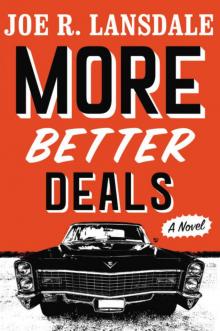 More Better Deals
More Better Deals The Elephant of Surprise
The Elephant of Surprise Piercing the Darkness: A Charity Horror Anthology for the Children's Literacy Initiative
Piercing the Darkness: A Charity Horror Anthology for the Children's Literacy Initiative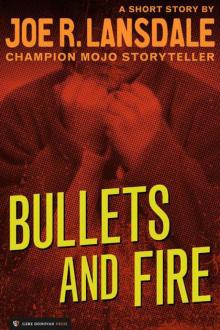 Bullets and Fire
Bullets and Fire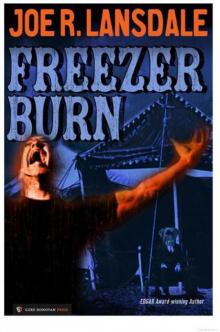 Freezer Burn
Freezer Burn The Two-Bear Mambo
The Two-Bear Mambo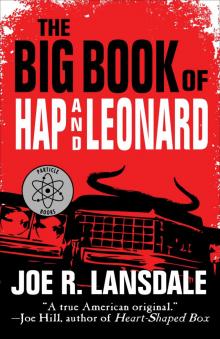 The Big Book of Hap and Leonard
The Big Book of Hap and Leonard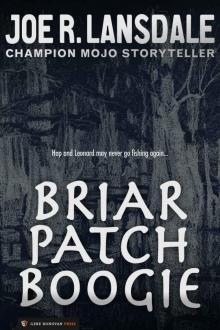 Briar Patch Boogie: A Hap and Leonard Novelette
Briar Patch Boogie: A Hap and Leonard Novelette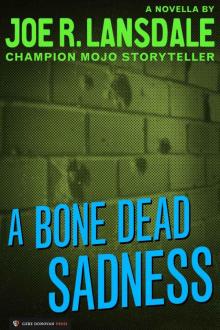 A Bone Dead Sadness
A Bone Dead Sadness Steampunked
Steampunked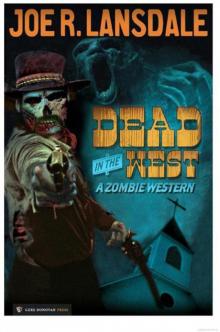 Dead in the West
Dead in the West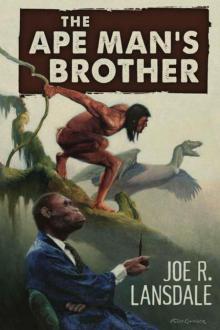 The Ape Man's Brother
The Ape Man's Brother The Bottoms
The Bottoms Cold in July
Cold in July The Complete Drive-In
The Complete Drive-In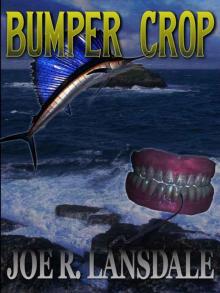 Bumper Crop
Bumper Crop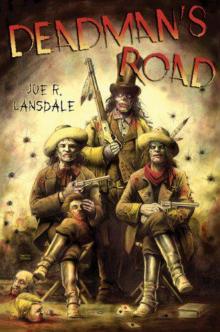 Deadman's Road
Deadman's Road Captains Outrageous
Captains Outrageous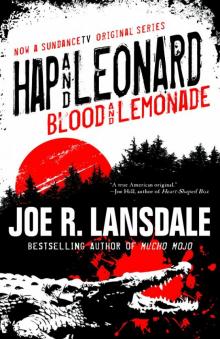 Hap and Leonard: Blood and Lemonade
Hap and Leonard: Blood and Lemonade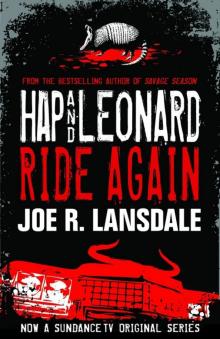 Hap and Leonard Ride Again
Hap and Leonard Ride Again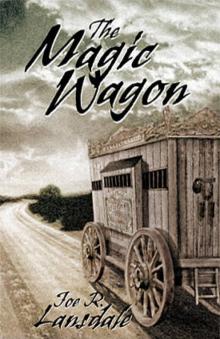 Magic Wagon
Magic Wagon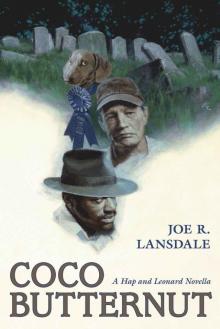 Coco Butternut
Coco Butternut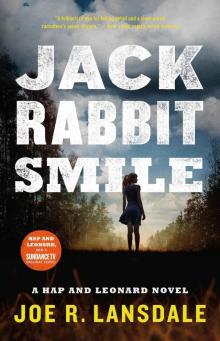 Jackrabbit Smile (Hap and Leonard)
Jackrabbit Smile (Hap and Leonard)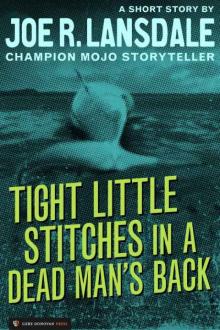 Tight Little Stitches in a Dead Man's Back
Tight Little Stitches in a Dead Man's Back Leather Maiden
Leather Maiden Cold Cotton: A Hap and Leonard Novella (Hap and Leonard Series)
Cold Cotton: A Hap and Leonard Novella (Hap and Leonard Series) All the Earth, Thrown to the Sky
All the Earth, Thrown to the Sky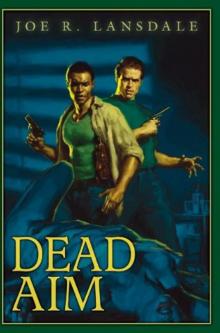 Dead Aim
Dead Aim Edge of Dark Water
Edge of Dark Water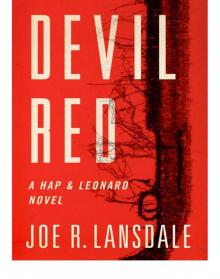 Devil Red
Devil Red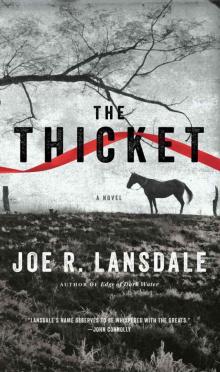 The Thicket
The Thicket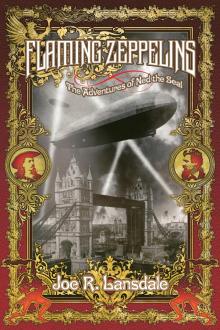 Flaming Zeppelins
Flaming Zeppelins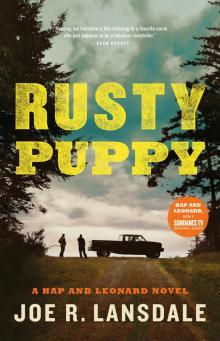 Rusty Puppy
Rusty Puppy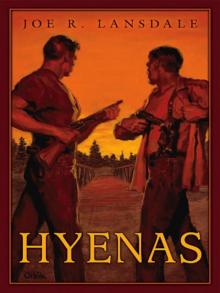 Hyenas
Hyenas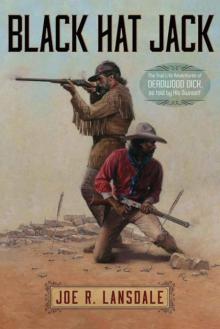 Black Hat Jack
Black Hat Jack Rare Lansdale
Rare Lansdale Christmas With the Dead
Christmas With the Dead The Best of Joe R. Lansdale
The Best of Joe R. Lansdale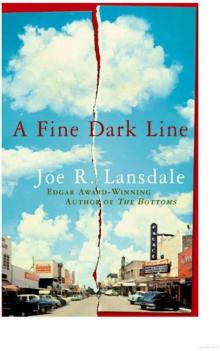 A Fine Dark Line
A Fine Dark Line Rumble Tumble
Rumble Tumble Waltz of Shadows
Waltz of Shadows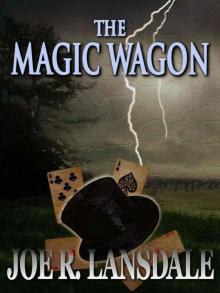 The Magic Wagon
The Magic Wagon Stories (2011)
Stories (2011)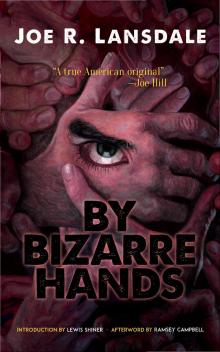 By Bizarre Hands
By Bizarre Hands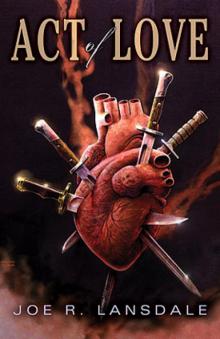 Act of Love (2011)
Act of Love (2011)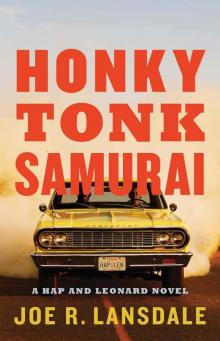 Honky Tonk Samurai (Hap and Leonard)
Honky Tonk Samurai (Hap and Leonard)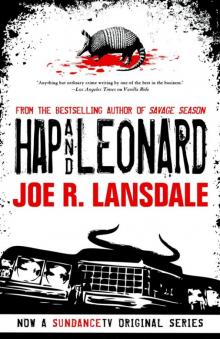 Hap and Leonard
Hap and Leonard A Pair of Aces
A Pair of Aces Vanilla Ride
Vanilla Ride Bad Chili
Bad Chili The Killer's Game
The Killer's Game Paradise Sky
Paradise Sky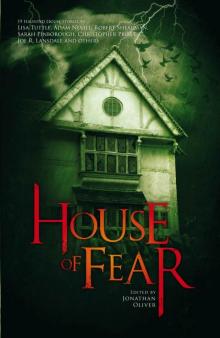 House of Fear
House of Fear Lost Echoes
Lost Echoes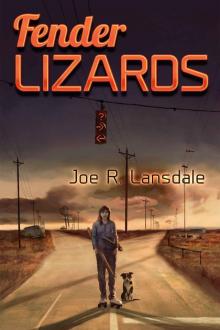 Fender Lizards
Fender Lizards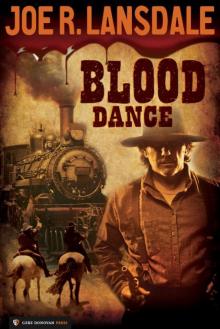 Blood Dance
Blood Dance Hot in December
Hot in December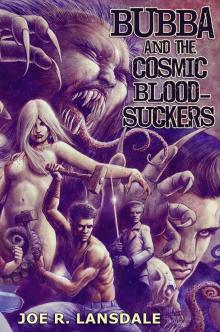 Bubba and the Cosmic Blood-Suckers
Bubba and the Cosmic Blood-Suckers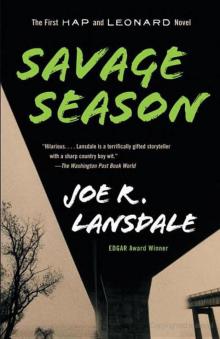 Savage Season
Savage Season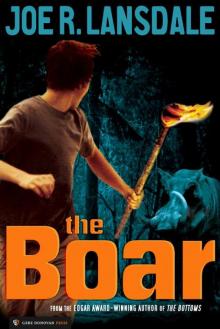 The Boar
The Boar Miracles Ain't What They Used to Be
Miracles Ain't What They Used to Be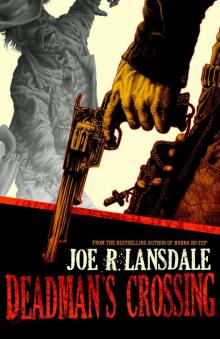 Deadman's Crossing
Deadman's Crossing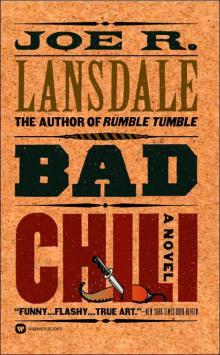 Bad Chili cap-4
Bad Chili cap-4 Hoodoo Harry
Hoodoo Harry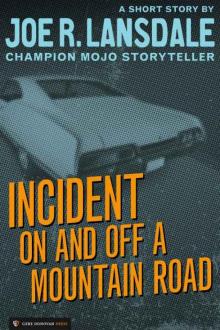 Incident On and Off a Mountain Road
Incident On and Off a Mountain Road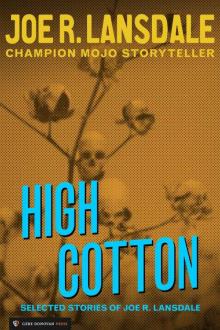 High Cotton: Selected Stories of Joe R. Lansdale
High Cotton: Selected Stories of Joe R. Lansdale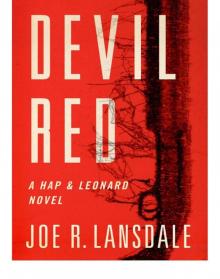 Devil Red cap-8
Devil Red cap-8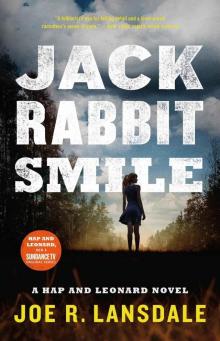 Jackrabbit Smile
Jackrabbit Smile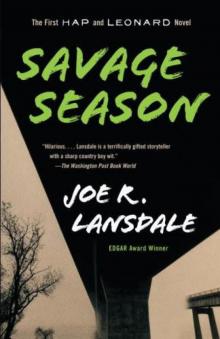 Savage Season cap-1
Savage Season cap-1 Sunset and Sawdust
Sunset and Sawdust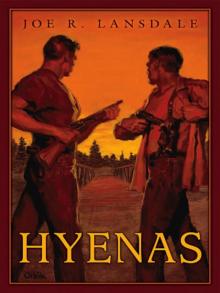 Hyenas cap-10
Hyenas cap-10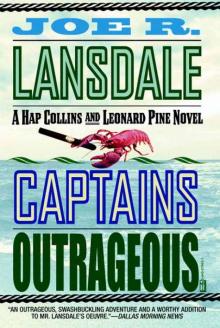 Captains Outrageous cap-6
Captains Outrageous cap-6 The Steel Valentine
The Steel Valentine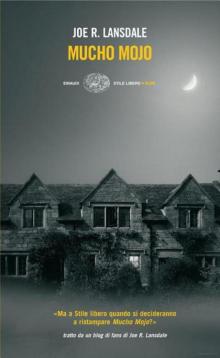 Mucho Mojo
Mucho Mojo Vanilla Ride cap-7
Vanilla Ride cap-7 Mucho Mojo cap-2
Mucho Mojo cap-2 The Two-Bear Mambo cap-3
The Two-Bear Mambo cap-3